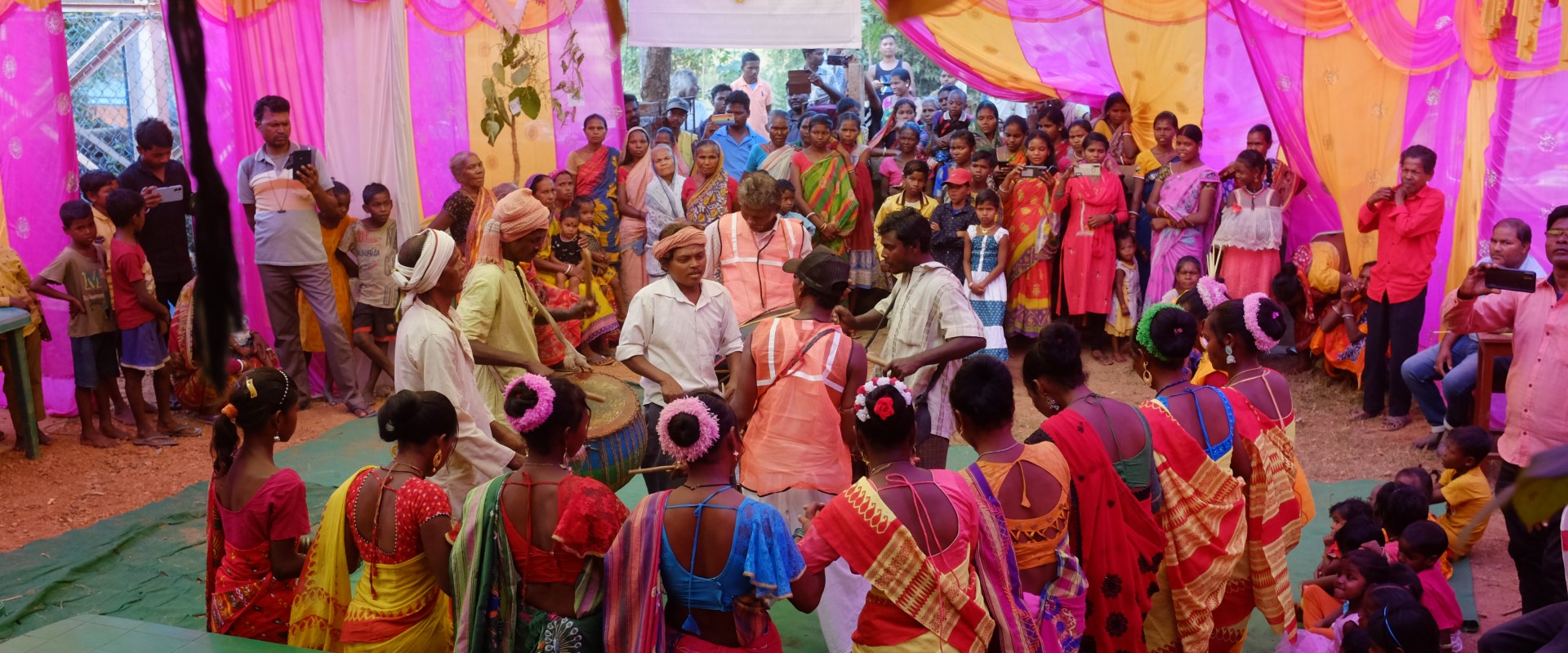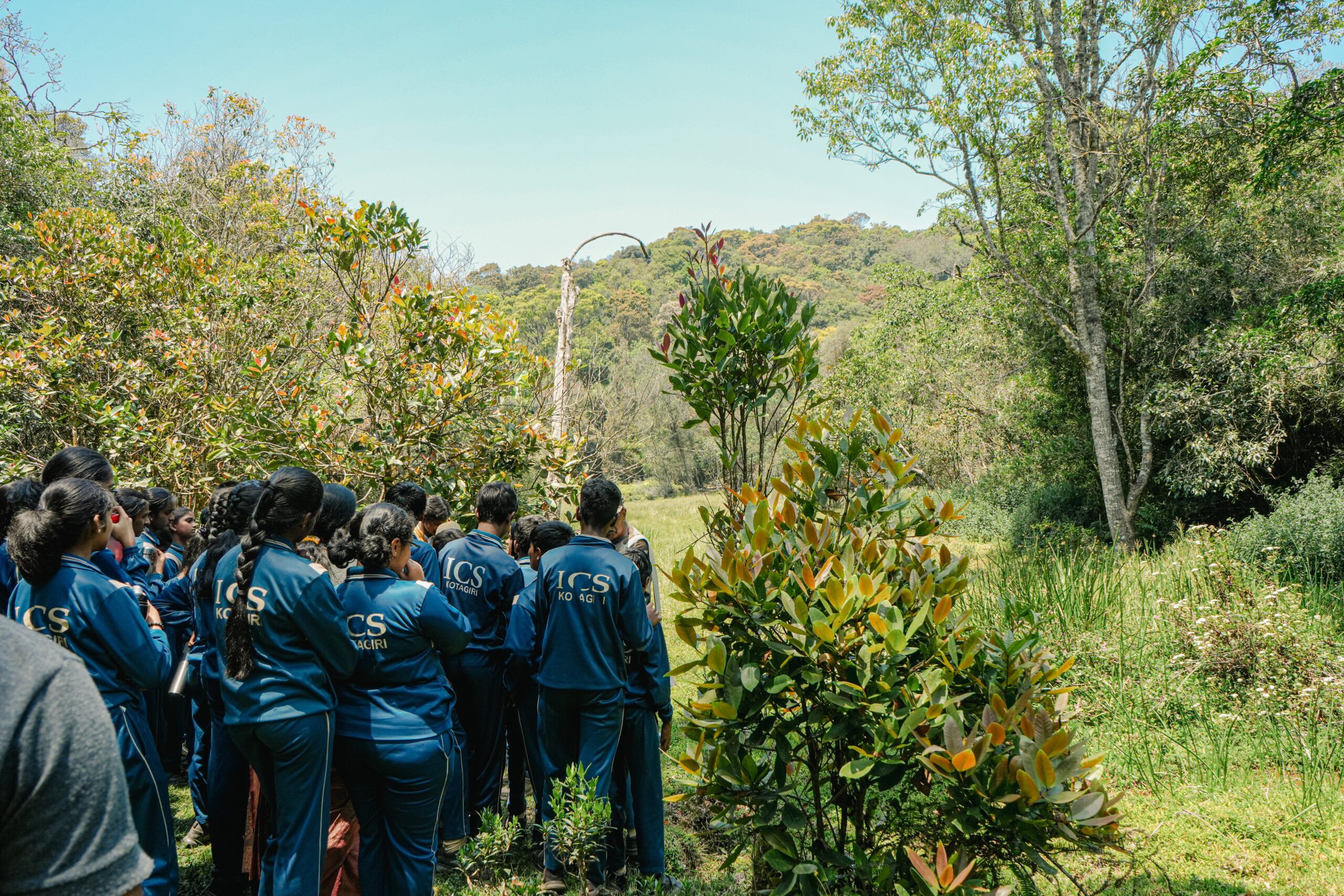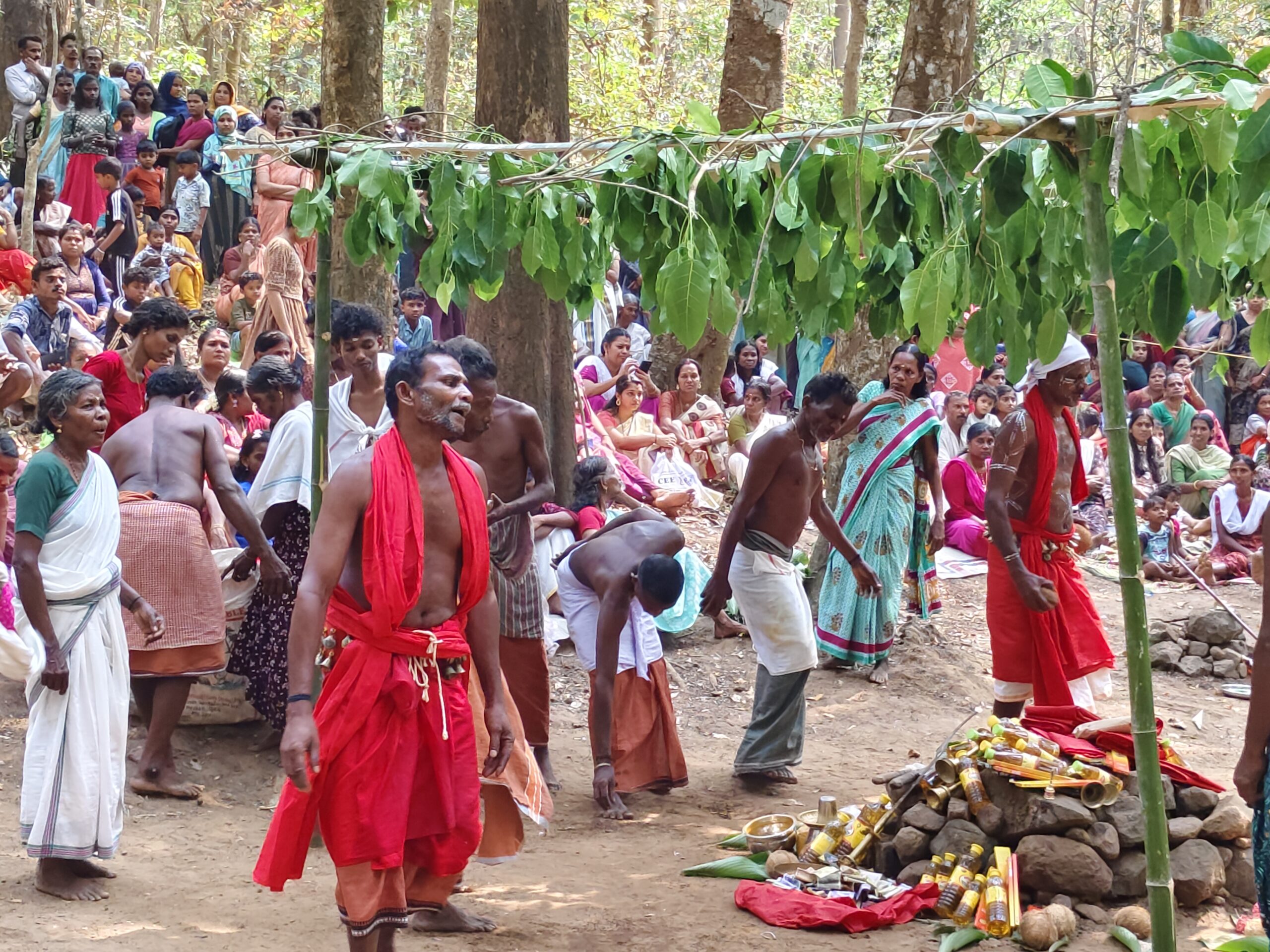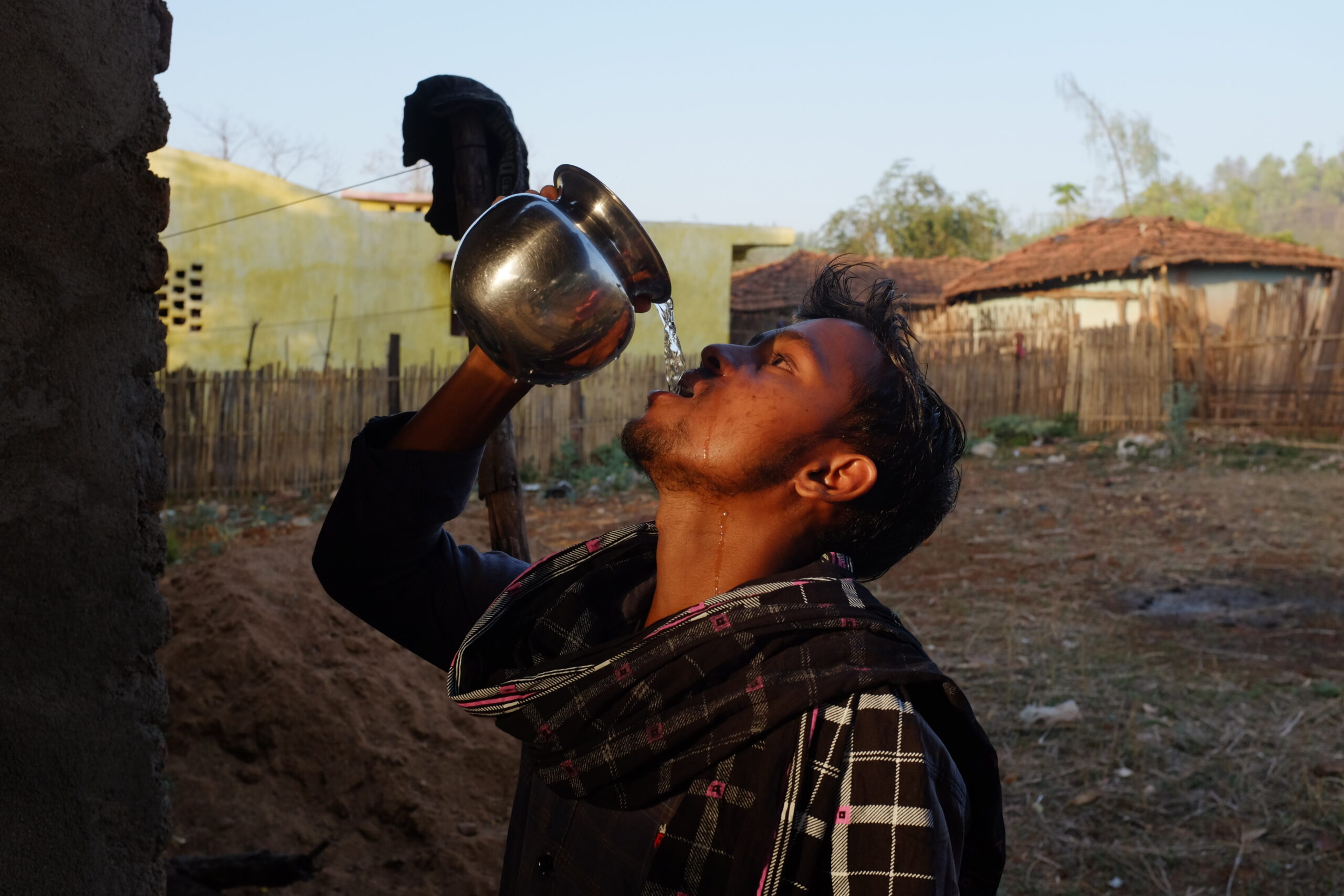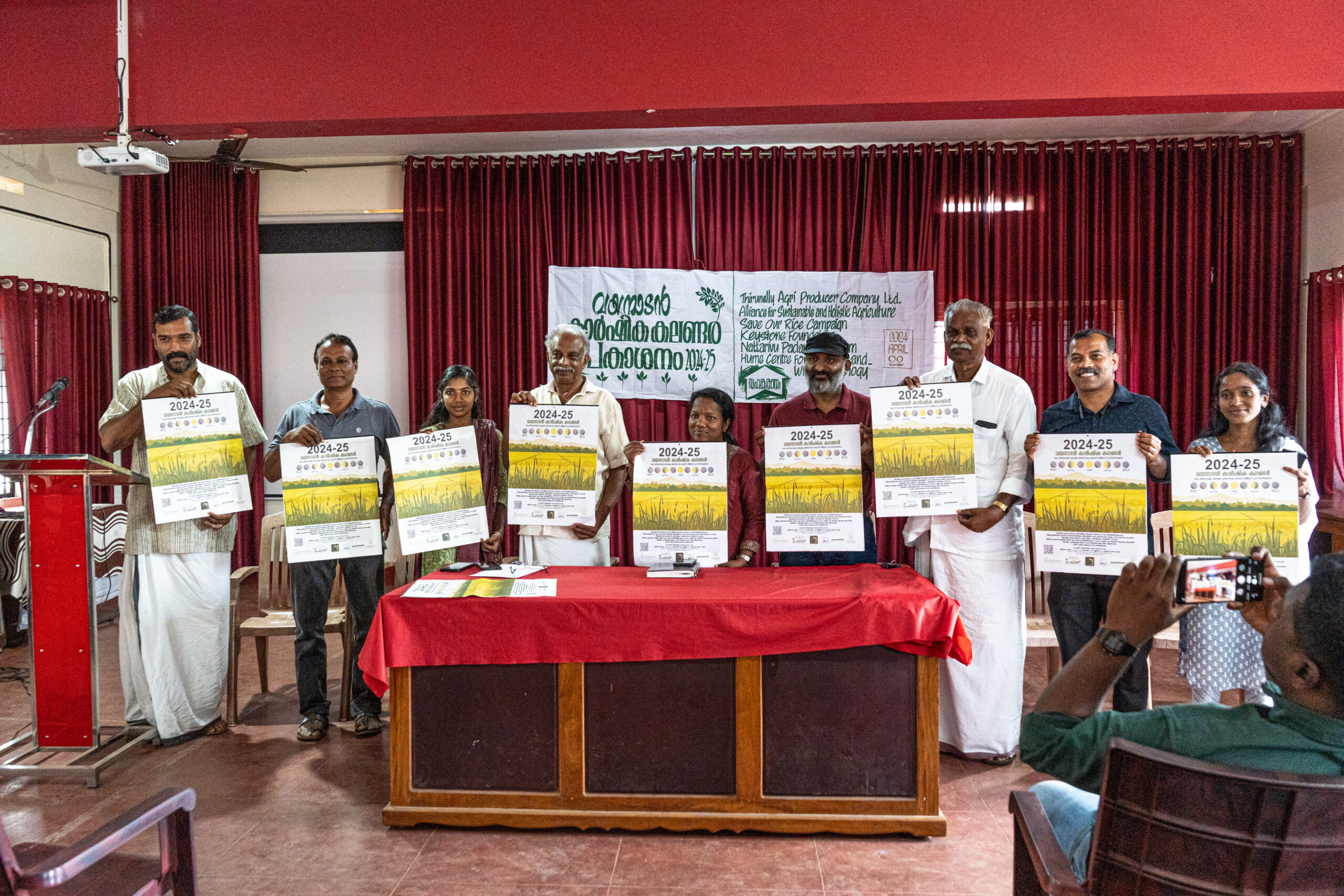January 4, 2024
By Rohan Mukerjee
During the peak of the harvest season this winter, two food festivals were organized – one in Hatnada village, Hudu panchayat, Seraikela block, Seraikela-Kharsawan district, Jharkhand, and the other in Mirgichami Sabar Para, Bandwan block, Purulia district, West Bengal. These festivals celebrated the diverse variety of crops and uncultivated food consumed by forest-dwelling communities. As industrial/chemical agriculture practices dominate and diets increasingly modernise, these communities work hard to revive and strengthen traditional food systems. They are a key part of the global shift back to natural and ecological farming practices, and conservation and promotion of wild and uncultivated foods being at the forefront of these efforts.
Traditional Food Mela and Knowledge Sharing at Hatnada
On November 17, Budheswar Mahato (Community Resource Person) and Jagabandhu Sanda (Consultant) and several local community members including Mangal Munda from Sardabera organised the festival at Hatnada village. People from neighbouring villages Udaypur, Kalajhor, Sardabera, Janglikhas and Lapaibera attended as well, with a total of around 370 participants, almost 200 of which were women. The highlight of the program was knowledge sharing by men and women village elders with around 70 village elders coming together for the event. Several village elders shared their knowledge and experiences on traditional agricultural practices, crops, wild foods, and diets they consumed in the past. They also drew attention to current challenges like the impacts of chemicals, hybrid crops, commercial foods and the associated erosion of traditional agriculture, knowledge, seeds, healthcare and nutrition. They also stressed the threats posed to the social fabric of their region by the rise in consumption of liquor and the problems that come with this.
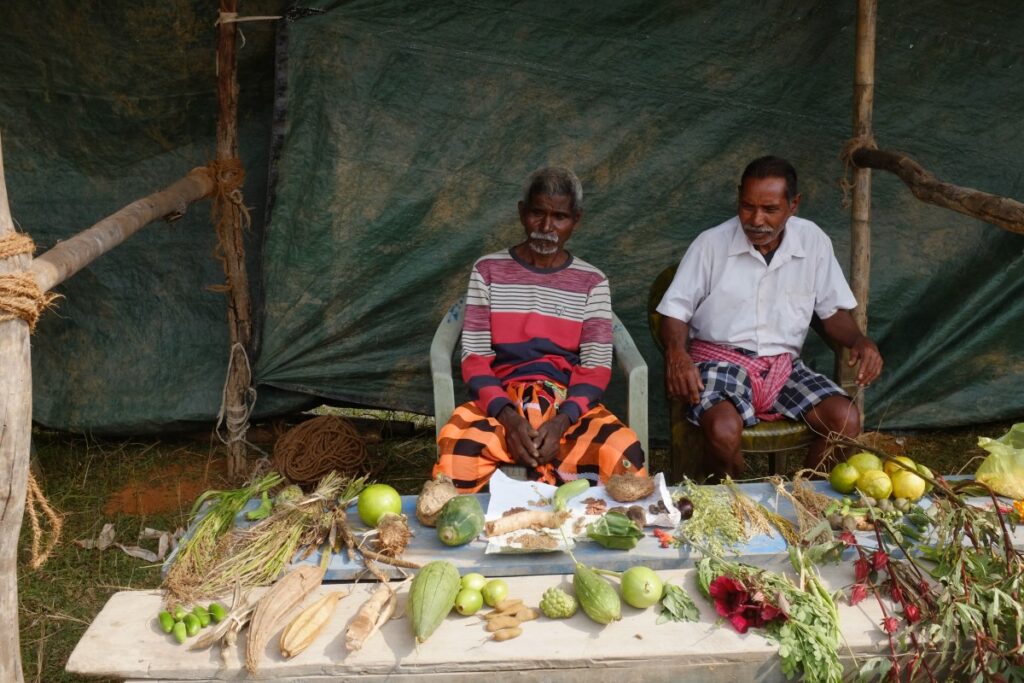
Duma Maghi from Kalajhor spoke of how change can be observed through the roofs of their homes, which have altered as drastically as diets. The durable thatched grass roofs of the past were eventually replaced by tiles that contain asbestos. These modern crops replacing native foods have led to frequent illnesses. Duma shared that in the past they used to collect and consume a variety of wild foods like tubers, greens, mushrooms, fruits and seeds. However, these nutritious wild foods have been disappearing from their diets with the younger generation fast losing the knowledge associated with their identification, collection and processing. He also raised concerns about the negative impacts of climate change especially with regards to rainfall which they depend on for all their farming practices. He said that they are observing less rain, and erratic patterns that do not and whatever rainfall they do get is erratic and often comes in an untimely manner which does not help their crops and in fact often damages the crops.
Sukurweri Lohar from Sardabera shared experiences from her youth with regards to the wild greens and other uncultivated food they used to collect as well as the traditional crops like kodo millet, gundli (little millet) and mandua (finger millet) and diverse varieties of vegetables which have now disappeared from their fields.
Chhotelal Sardar stressed the challenges posed by the shift from traditional farming using manure and other organic inputs to an increased dependency on chemical inputs which negatively impact the soil, the environment and their overall health and well-being. He also highlighted the problems they are facing as a result of emigration and the need to ensure viable and sustainable livelihood avenues here itself.
Special invitees of the programme include Lakhan Sardar, Gram Pradhan of Udaypur village, ward member Budheswar Sardar, Mono Tudu, Panchayat Samiti Member, Hudu Panchayat; and Laxmi Sardar Zilla Parishad Member. Lakhan Sardar, a 50-something-year-old, shared his memories of how when he was young they used to go to the forest to collect wild tubers like baola and fruits like bhela and kend. He also recollected cultivating traditional crops like kodo and gundli which have now disappeared from their fields.
Mono Tudu was very appreciative of the decision to bring men and women elders together to hear their experiences and learn from them, especially on solutions.
Community Resource Person Budheswar Mahato provided an overview of the work he and Keystone have been carrying out in the area including distribution of traditional seeds for mixed cropping in agricultural fields and in badi / kitchen gardens; trainings in preparation and use of organic fertilisers and pest repellents; promotion and conservation of wild and uncultivated food; supporting community led protection and management of forests; and strengthening community institutions like Gram Sabha and women’s Self Help Groups (SHGs).
The community consultation and knowledge sharing ended with a traditional Bhuyanj Naach performed by a group from Janglikhas.
Alongside the consultations and discussions community members from different villages had set up a display of various crops, wild and uncultivated foods, and medicinal plants. Participants of the traditional food exhibit included Chotelal Sardar and Doman Sardar from Udaypur; Sarda Munda from Sardabera; Suresh Hansda from Kalajhor; Ram Bodra from Hatnada; Gurapada Sardar, Rakesh Hansda and Soma Munda. Village elder Ram Bodra was very proud of his display and with a twinkle in his eye he asked if we could identify different items on display and when we conceded defeat, he patiently shared the names of the items along with their uses, benefits, where they are found or how and when they are cultivated.
Despite the spread of modern hybrid seeds and food items it was heartening to see that the local communities were still cultivating such a diverse variety of paddy, maize, millets, pulses and vegetables. A number of traditional paddy varieties were on display and they included – sengal hudu / sengal baba, birsa gora, koya, anjal dhuli, malti and sarjom baha. While several millets were cultivated in these villages in the past their cultivation has declined considerably. However, through the Eastern India initiative several farmers have resumed the cultivation of some millets in their lands and some of these like Kodo, bada madua (finger millet), gundli (little millet) and gangai (sorghum). While farmers of the area do not recollect having cultivated bajra (pearl millet) has not traditionally been cultivated some bajra seeds were distributed to farmers this year and farmers like Binod Sabar have reaped a good harvest of bajra. A lot of other produce from their fields badi (Homestead plots) was also on display and this included several varieties of chilli – dhan marich, dhoba marich, and kul marich; gaach baigan (brinjal), black brinjal, jhinga, haldi (turmeri), kachu (taro), barbatti, kundri, nanua, lauki, karla, lal chenka pat / ful, papita, simal aloo, and sutri. A variety of wild tubers, greens and fruits were also on display. Soma Munda had brought a variety of traditional medicines.
The event ended with a meal of Khichadi and Paish.
Celebrating Sabar Food Traditions and Agricultural Initiatives, Mirgichami Sabar Para, Bandwan Block, Purulia District, West Bengal
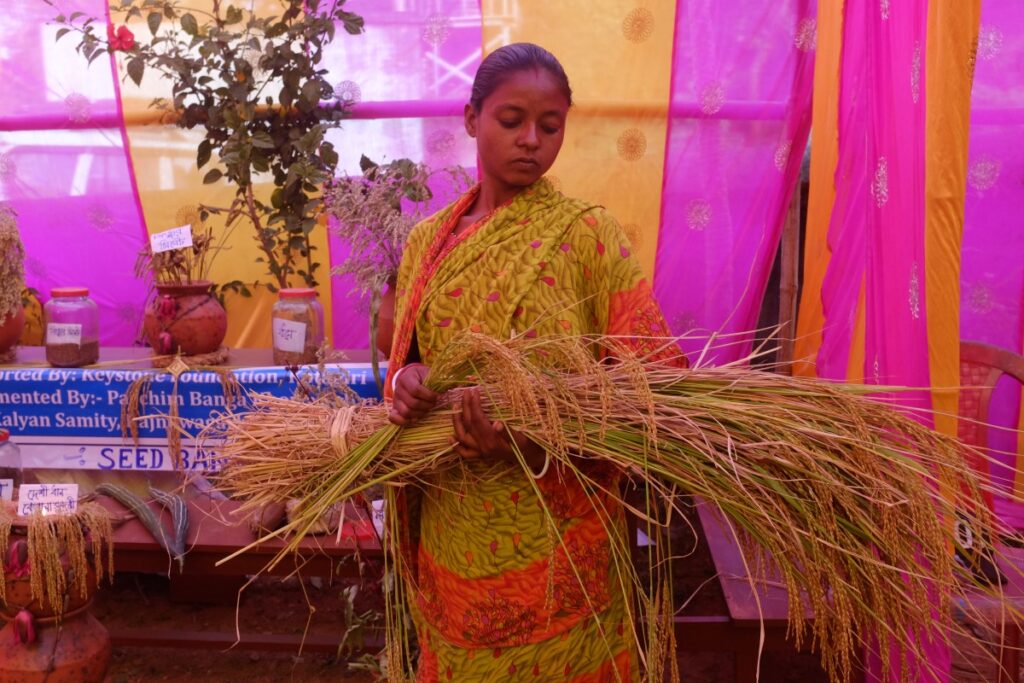
The following day on November 18, a similar mela was organised at Mirgichami Sabar Tolaby Community Resource Persons (CRPs) Binod Sabar and Jiban Hansda, Community Facilitator Fatik Kumar Hembram, members of Paschim Banga Kheria Sabar Kalyan Samiti (PBKSKS) the local partner organisation, and members of the Sabar community. The Sabar were historically dependent on the forests for their livelihoods and sustenance. Over time, they gradually settled in hamlets on the outskirts of larger villages, mostly adjoining forests. With the destruction and degradation of the forests they depend on their livelihoods and sources of food and sustenance have come under threat. PBKSKS has been supporting the Sabar people to take up agriculture with support from Keystone’s Using Diversity project and the Eastern India initiative, promoting agroecology using local seeds and organic inputs. Several farmers and Sabar households have received seeds of variety of crops like paddy, maize, sorghum, finger millet, foxtail millet, little millet, pigeon pea, cow pea, and a variety of other pulses and vegetables. Sabar households have also been supported in setting up kitchen gardens where they have a been cultivating a variety of vegetables and also planting some wild food trees and plants.
Sabar villages with remaining forest patches still have access to a variety of wild and uncultivated foods like tubers which had formed an important part of the traditional Sabar diet, wild greens, fruits, flowers and seeds and wild mushrooms found primarily during the monsoons. However, with increasing dependence on the Public Distribution System, and the market to meet their food need today’s generations of Sabar people are moving away from wild and uncultivated foods which has been integral part of their traditional food system contributing towards their health and nutritional security. CRPs have been working with Sabar villages in Bandwan block to spread awareness about the importance and benefits of wild food, promote inter-generational knowledge exchange on wild foods through village elder programs and have been facilitating the planting of saplings of wild food trees and plants raised in community nurseries.
This programme celebrated the wild food traditions as well as the farming efforts of the Sabar people for which two exhibits were set up. The first exhibit had a mix of the variety of crops that are currently being cultivated by Sabar households’ side by traditional wild foods. The crops on display included – paddy, maize, sorghum, sweet potato, kochu (taro), radish, sim, bitter gourd, tomato, brinjal, ridge gourd. A variety of wild tubers and other wild foods were also on display – tondo aloo fruit and tubers, baola aloo, banya aloo, kulu aloo, sushni aloo, muhar aloo, ban kundri aloo, kudol saag, amra, and kurkuit (red weaver ants).
A second exhibit celebrated the local community seed bank initiative, to be managed by the community with farmers returning a little more than the initial quantity of seeds they received from the seed bank. CRP Jiban Hansda invited Ratnabali Sabar, President of PBKSKS to inaugurate the seed bank.
The programme commenced with a traditional Sabar dance and song. The Sabar are experts at composing songs and they presented several renditions covering diverse topics that included the focus of the present programme, the wild food traditions of the Sabar people with a focus on the collection and preparation of wild tubers, the fact that other communities have prospered but the Sabar have been left as they have been drowned in or overwhelmed by alcohol; how the Sabar have been discriminated against when it comes to government schemes and privileges like Krishak Bandu and Pension because they are not powerful and they don’t have land. The singers were mostly women and they included Bhabi Sabar, Rabani Sabar, Poshtu Sabar, Radhika Sabar, Jyostna Sabar, Gobindo Sabar, Sarati Sabar, Budhni Sabar, and Saroti Sabar.
The program was anchored by Chottulal Sabar who highlighted the importance of traditional foods of the Sabar people like wild tubers and the need to revive their availability and consumption. He announced a few tubers could be sampled by the participants. Many members of the younger generations had never eaten these tubers before!
Prasanta Rakshit, Director of PBKSKS, spoke about possible initiatives that could promote food sovereignty among the Sabar people through community seed banks and by promoting natural farming and kitchen gardens to meet household nutritional needs. He spoke about the importance of wild and uncultivated foods, participatory research on them and documentation of Sabar food traditions.
Fatik Kumar Hembram provided an overview of the initiatives to promote and revived traditional wild and uncultivated foods as well as the agroecology initiatives. He gave an open invitation to Sabar families who are interested in natural and organic farming to get in touch with him or the CRPs to be part of the initiative in the upcoming year.

